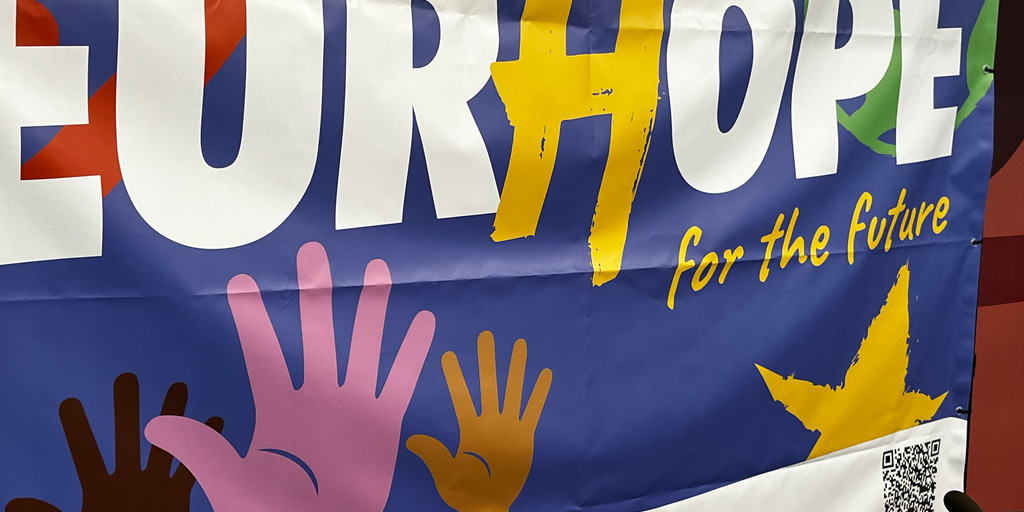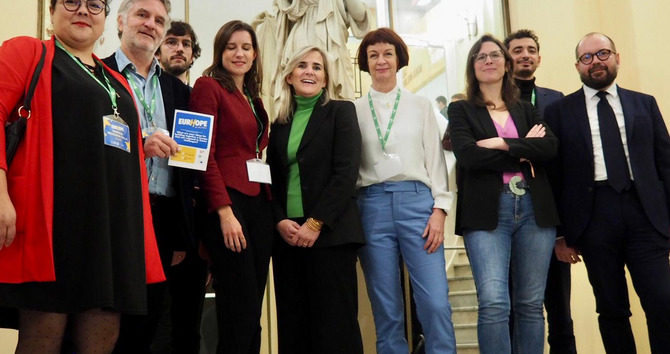EurHope is a joint initiative of the Young European Federalists (JEF) and Make.org, conducted with the support of the EU Parliament, the Bertelsmann Stiftung and other partners. Initially, young European citizens in all 27 EU member states participated on a multilingual online platform, where they answered the question: what are your ideas for building together a Europe that can respond to future challenges?

Archiv Bertelsmann Stiftung
European election 2024: European youth demands institutional reforms for more democracy in the EU
In these dramatic times, young Europeans speak with one voice: for the EU to tackle global challenges, we need a reformed Europe with more citizen participation, greater transparency and more efficient institutions. These are the core findings of the unique Europe-wide participative initiative EurHope, which is supported by the Bertelsmann Stiftung.
Content
Unique Europe-wide online participation for young Europeans
Mass participation of young Europeans: 1,500,000 opinions on the future of the EU
In total, the voices of 1,500,000 young people aged 15-34 from all EU member states were heard. The young Europeans submitted 5,000 concrete ideas on the future of the EU. The result of this unique form of participation is the “Agenda of Hope”. The aim is to put young people’s voices in the forefront of the political debate and integrate them into political manifestoes for the European elections.
The project initiators presented the results of the online participation scheme for the first time on 10. November. Around 200 persons from all over Europe met European politicians, think-tanks, JEF activists and other stakeholders in Madrid to discuss the “Agenda of Hope”. By far the most important issue for young Europeans is “EU democracy, participation and institutions,” followed by “Climate change and environment”. “Economy, work and social justice” is in third place. Dubravka Šuica, European Commission Vice-President for Democracy and Demography, congratulates the project organisers and is impressed by the high participation rate.
Picture gallery
EU democracy, more citizen participation and more efficient institutions
Young Europeans are calling for stronger participation of citizens in EU policymaking. They advocate closer involvement of European citizens in political decision-making by means of a permanent citizen participation mechanism. They also propose more direct dialogue between citizens and institutions for consultation on specific relevant topics, and an online platform or apps to promote more citizen involvement in political decision-making processes.
Citizen participation must become living reality throughout Europe
Anna Renkamp, Bertelsmann Stiftung democracy expert
In her incentive, Anna Renkamp from the Democracy and Social Cohesion programme addresses the demand for more citizen participation. Since the European elections in 2019, the EU has created numerous new opportunities for citizen participation – but that in itself is not enough. Institutional reforms such as a permanent mechanism for participation of European Citizens´ Panels at European, national, regional and local level could give EU democracy a new boost. This is all the more important in view of EU expansion. Acceptance and support for the integration of new states can only be created through democratic reforms and the strong involvement of European citizens.
More transparency and an improved fight against corruption
Young Europeans unanimously agree that we need more transparency and communication in the EU, which would achieve more trust in and legitimation for the EU. The participants advocate the reinforcement of ethical principles in EU policymaking and administration. They call for stricter transparency rules to reduce the influence of organised lobby groups and for more efficient institutions to combat corruption.
The most important institutional reform is the abolition of the unanimity rule in the Council
Guy Verhofstadt, MEP, Renew Europe group
Guy Verhofstadt supports young Europeans’ demands for institutional reforms. In November, the EU Parliament put forward a number of proposals for changes to EU treaties. Verhofstadt stresses that the EU will only be able to play an active part in a world of competing systems and economic superpowers by abolishing the unanimity requirement.
Climate change, environment, business and other topics
There are summaries of the concrete proposals of young Europeans for “Climate change and environment“, “Economy, work and social justice“ and other topics in the report “EurHope. Final report of the online consultation 2024 European Election participatory engagement campaign for young citizens”.
Report
About the participative method – a reflection of the diversity of young Europeans
More than 200,000 young European citizens took part in the mass online participation scheme. The participants reflect the diversity of the young population of the European Union. Young people from all 27 EU member states took part, 47 per cent of them aged 15-24 and 53 per cent aged 25-34. 49 per cent of the sample were women and 51 per cent men, with different levels of education (30 per cent basic, 43 per cent intermediate and 27 per cent higher education). Proposals on which there was a consensus of participants were discussed, as well as proposals upon which the participants disagreed.
The next steps – broad discussion of the proposals
The “Agenda of Hope“ will be discussed at various presentations and events – online and face-to-face, with institutions, politicians and civil society – until shortly before the 2024 European Elections. The final event with European Election candidates will take place in Brussels in May.




